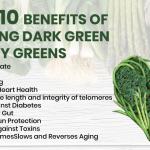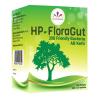Eating a diet rich in leafy greens can offer numerous health benefits including reduced risk of obesity, heart disease, high blood pressure and mental decline. Leafy green vegetables are an important part of a healthy diet. They’re packed with vitamins, minerals and fiber but low in calories.
1. Rich in Folate
The word folate describing the B vitamin originates from the Latin root word folium, which means leaf. The function associated with folate is varied and works in conjunction with other nutrients. Folate deficiency is common and leads to a host of health problems you don’t want including digestive disorders, cardiovascular disease, and most famously perhaps, birth defects. Folate is also crucial in epigenetics through a process known as methylation where folate acts as a methyl donor promoting cellular differentiation. Folate is also essential for DNA and RNA synthesis, amino acid production, and cell division. In short, you really, really need it.
2. Burn Fat
Greens are recommended as a weight-loss food. Greens are low caloric while still being packed with nutrients and other active compounds, however, greens’ effect on weight loss goes beyond just calories. Greens contain nitrites, which have been associated in browning fat cells, meaning converting fat-storing white cells into fat-burning brown cells. This creates extra fat burning and ultimately, weight loss.
3. Anti-Aging
A study carried out at Rush University medical center reported a significant decrease in the amount of cognitive decline for those participants consuming higher amounts of dark green leafy vegetables. The researchers associated the high vitamin K, folate, beta-carotene and lutein present in these greens as influencing this anti-aging effect. Green’s antioxidants, brain protection, cellular support, anti-inflammatory benefits, and essential fatty acid nutritional contribution all contribute to anti-aging as well.
4. Improve Heart Health
Cardiovascular health is positively influenced multiple ways when making greens a continuous part of your food choices. First, greens regulate the production on a hormone known as erythropoietin, which decreases blood viscosity. This potentially reduces blood clots and heart attacks. Greens’ dietary fiber helps regulate cholesterol and trygliceride levels in a positive way making sure they don’t cause any unnecessary trouble. Nitric oxide — our internal blood pressure regulator — is positively influenced through the consumption of greens. High homocysteine has been linked with cardio vascular diseases, but greens provide substrates that convert homocysteine into harmless amino acids.
5. Protect the length and integrity of telomeres
Cell division is necessary for growing new skin, blood, bone, and other cells, and telomeres keep the main part of the chromosome — the part essential for life with your DNA code — from shortening each time a cell divides. To fuel telomeres, we have to eat what our cells eat so they stay healthy. Dark, leafy greens have A LOT of what our cells need! A diet rich in greens is well documented to protect telomere length and integrity.
6. Fight Against Diabetes
Glucose imbalances, which can lead to complications such as diabetes, can be prevented and regulated by introducing greens into your diet. Magnesium, ALA omega-3 fatty acid, and polyphenols found in greens are considered to be of crucial importance in managing glycemic load and insulin sensitivity.
7. Feed Your Gut
Through Jeff Leach at The Human Food Project work with people following a modern hunter-gatherers’ type diet, he is able to deduce the effect of high-plant-based diets and the resulting effect on the human microbial community even when consuming high volumes of animal products. He believes high fiber content in plants provide substrates for gut microbes to digest and create byproduct that effect various gut metabolic activities including PH balance, gut permeability, immune balance, bowel movements and so forth.
8. Provide Sun Protection
For all you sun lovers, greens provide UV protection at a cellular level through the antioxidant and anti-inflammatory benefits of carotenoids such as lutein and zeaxanthin.
9. Protect Against Toxins
Aflatoxins are types of toxins produced by fungi, and they are one of the most carcinogenic (cancer-causing) substances known. Chlorophyll found in plants and abundant in particular in greens has a neutralizing effect on these ubiuitous toxins; it does this through directly trapping the toxin, rendering it harmless.
10. Build Enzymes
Enzymes are the body’s sparks. A lack of enzymes keeps us from digesting our food and getting all the nutrients out of them. Raw foods have the most alive, active enzymes. When you are adding fresh, raw salads to your diet, you’re boosting the enzymes your body needs. Greens consumption also increases the activity in your body of a specific family of enzymes known collectively as GSTs. They promote cellular detoxification of toxins such as the already mentioned aflatoxins, but also of xenobiotics, which are foreign substances that can contribute to diseases. Greens provide proven health benefits! What else do you need to know to starting including a heaping serving of greens with every meal if possible?
Related Topics
Wheatgrass vs Barley Grass – Are They Heaty Or Cooling?
Wheatgrass vs Barleygrass – Which One Should You Take?
Dark Green Leafy Vegetables Detox Heavy Metal
Is All the Green Foods Same? Why We Should Consume a Different Variety of Green Foods?
Top 10 Benefits of Eating Dark Green Leafy Greens
Liquadry’s Organic Volcanic Wheatgrass & Barley Grass
Sepuluh Faedah Makan Sayur-sayuran Berdaun Hijau Gelap














Facebook Comments